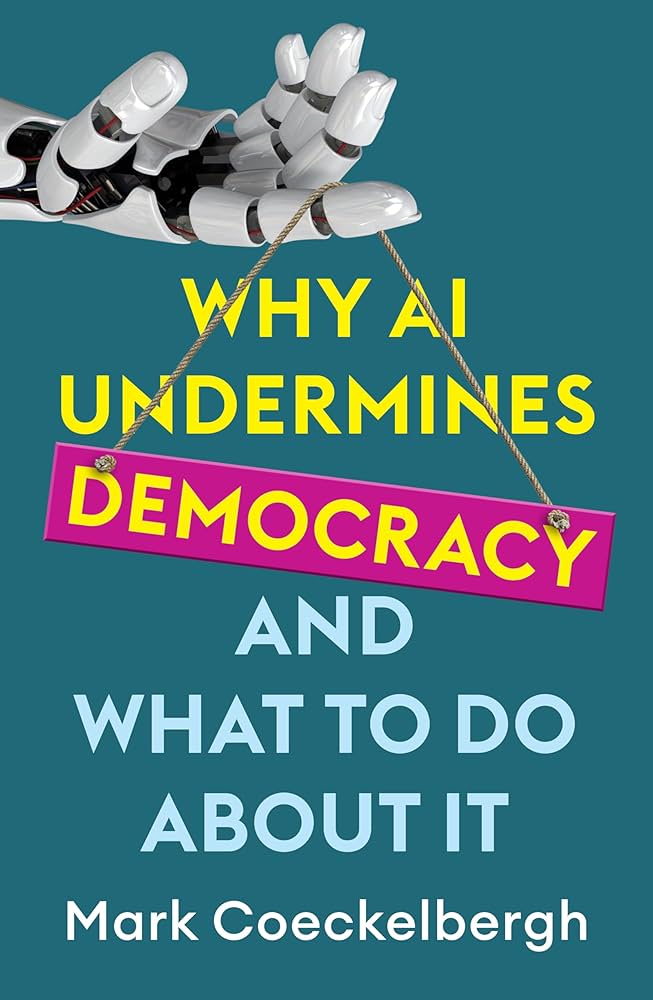Mark Coeckelbergh’s book delves into the complex and multifaceted relationship between artificial intelligence (AI) and democracy, articulating the significant risks AI poses to what he deems democratic principles. The author embarks on a comprehensive exploration, commencing with a historical perspective and extending through political-philosophical discussions, to analyze how AI impacts democracy. Coeckelbergh not only identifies the dangers AI presents but also offers solutions and insightful approaches to align AI with democratic values. The overarching theme is a call for a renaissance in political culture and education to safeguard and enhance democracy in the digital age, with a note on the ’common good’.
Following an introductory chapter, the author provides a historical overview in Chapter 2, illustrating how new technologies have historically led to increased centralization of power. Despite this trend, Coeckelbergh emphasizes that technological influence on politics is not deterministic, suggesting that the outcomes of technological advancements for political systems depend on how they are managed and integrated.
Chapter 3 delves into the definitions of AI and democracy, highlighting the necessity of linking discussions of AI with political philosophy to navigate the complex and contested nature of democracy. He argues for a broader understanding of democracy beyond mere voting, advocating for deliberative, participative, and republican ideals to address AI’s impact on democratic processes. This chapter sets the foundation for the subsequent analysis by establishing a nuanced understanding of the key concepts involved.
In Chapters 4 and 5, the book scrutinizes how AI jeopardizes liberal-democratic principles such as freedom, equality, fraternity, and the rule of law. Coeckelbergh discusses how AI erodes the knowledge and trust essential for democratic functioning by creating power asymmetries, enabling manipulation, and blurring the lines between reality and falsehood. The discussion draws on contemporary work on the ethics and politics of digital technologies, emphasizing the risks AI poses to the epistemic foundations of democracy.
The subsequent chapters focus on solutions to mitigate these risks. Chapter 6 proposes democratizing AI development and integrating it with democratic political institutions. The author argues for changes at both technical and institutional levels, emphasizing the need for public deliberation and leadership in steering AI in a democratic direction. This chapter presents a roadmap for transforming AI to support democratic values rather than undermine them.
Chapter 7 shifts the focus from defensive measures to proactive creation, advocating for AI designs that support democracy. Coeckelbergh calls for a cultural and educational renaissance, facilitated by digital technologies, to nurture a political culture conducive to democratic values. This vision envisions a new Enlightenment and Renaissance, driven by a deep commitment to the common good, communication, and the creation of a more inclusive world.
In the final chapter, the text underscores the urgent need for AI and digital technologies that facilitate the pursuit of the common good and foster genuine communication to thwart anti-democratic forces and prevent authoritarianism and totalitarianism. The book concludes with a call for a holistic transformation in both technological development and political culture to safeguard democracy in the age of AI.
One of the most intriguing aspects of the book is its historical perspective on the relationship between technology and democracy. Another fascinating point is the discussion on the non-neutrality of AI. The book argues that AI inherently shapes political systems and societal norms, making it a profoundly political technology. This insight challenges the common perception of AI as merely a technical tool and highlights the broader societal implications of AI deployment. The author also brings attention to the risks AI poses to the epistemic foundations of democracy. Drawing on contemporary work, the book discusses how AI can create power asymmetries, enable manipulation, and blur the lines between reality and falsehood, thereby undermining the knowledge and trust essential for democratic functioning. A particularly strong and welcome section deals with the common good, where Coeckelbergh proposes a general Aristotelian and Platonic framework, with commentary from Aquinas, Machiavelli, and others.
The author’s approach in Chapter 6, which focuses on fortifying democracy in the face of AI, is multifaceted yet problematic. Coeckelbergh emphasizes that the resilience of democracy depends not only on mitigating the risks posed by AI but also on addressing the inherent weaknesses of current democratic institutions. He argues that democracy, while a commendable idea, has yet to reach its full potential. This perspective underscores the importance of strengthening democratic frameworks to make them more robust against the challenges posed by AI. Democracy thus becomes a blurry concept whose realization lies only in the distant future, revealing a utopian leaning on the part of the author.
An interesting proposal that illustrates this leaning is the ‘open mini-republic’, a concept borrowed from Landemore. It consists of a jury of randomly selected citizens tasked with deliberating and making laws. This model is proposed as a way to enhance democratic representation without resorting to direct democracy, preserving a form of representative selection. AI, in this context, can play a supportive role by diversifying the information landscape for citizens and acting as a gatekeeper to shield democracy from populist and authoritarian threats. While AI can assist in these roles, Coeckelbergh notes that ultimate control should remain with humans – specifically those who are democratically accountable – rather than tech company executives.
A notable weakness, in addition to this utopian leaning, is the use of mainstream buzzwords and the unqualified critique of political adversaries. Figures like Trump, Orbán, and Meloni are portrayed decisively as bogeymen. Coeckelbergh also falls into the traps of anti-gun rhetoric (in the context of the USA), anti-Brexit rhetoric, and the lauding of concepts such as the ’open society’, ‘critical theory literature’, and a ‘universal republic’ in the style of a world government. The author reveals certain left-leaning tendencies, as illustrated by his endorsement of democratizing AI, advocating for the socialization of private institutions and data, and calling for a form of world government. These proposals raise concerns about their practicality and ideological balance. Additionally, the book does not thoroughly define what constitutes AI beyond its distinction from ‘GOFAI’ (Good Old-Fashioned AI) and leaves open questions regarding the transhumanistic undertones of the conversation.
Overall, the book offers a comprehensive and thought-provoking analysis of the interplay between AI and democracy. The author tackles a multitude of perspectives on the subject, providing valuable insights and strong arguments, particularly in the final chapter on the common good. However, some proposed strategies appear contradictory and reflect certain prejudices, revealing the author’s apparent left-leaning sympathies. Despite these reservations, the book serves as a welcome contribution to the discourse on AI and democracy, offering a broad overview and a call to action.
‘Why AI Undermines Democracy and What To Do About It’ by Mark Coeckelbergh was published in 2024 by Polity (ISBN: 978-1-5095-4854-5). 172pp.
 Jan C. Bentz is a lecturer and tutor at Blackfriars in Oxford, with interests in how medieval metaphysics shaped modern thought. He also works as a freelance journalist.
Jan C. Bentz is a lecturer and tutor at Blackfriars in Oxford, with interests in how medieval metaphysics shaped modern thought. He also works as a freelance journalist.

